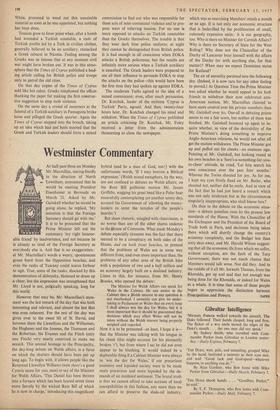Westminster Commentary
AT half-past three on Monday However that may be, Mr. Macmillan's state- ment was the last remark of the day that was both interesting and relevant, and almost the last that was even coherent. For the rest of the day was giVen over to the sweet lilt of St. David, and between them the Llewellyns and the Williamses, the Hugheses and the Joneses, the Thomases and the Robertses, the Evanses and the Finch (only one Finch) very nearly contrived to make me seasick. This annual homage to the Principality, the day-long debate on Welsh affairs, is a farce on which the shutters should have been put up long ago. To begin with, it allows people like the Reverend Llewellyn Williams (now there's a good Cymric name for you, man) to say of the Minister for Welsh Affairs, 'This Daniel has been thrown into a furnace which has been heated seven times more fiercely by the wicked Rent Bill of which he is now in charge,' introducing this magnificent hybrid (and he a man of God, too!) with the unfortunate words, 'If I may borrow a Biblical expression.' (Welsh mixed metaphors, by the way, are not confined to debates on Welsh affairs; on the Rent Bill guillotine motion Mr. James Griffiths, wagging his great head like a Polar bear mournfully contemplating yet another sunny day, accused the Government of 'allowing the money- lenders to enter the temples of the people's hearths.') But sham rhetoric, mingled with chauvinism, is no worse than any of the other shams endemic to the House of Commons. What made Monday's debate especially tiresome was the fact that there seemed to be a conspiracy on both sides of the House, and on both front benches, to pretend that the problems of Wales are in some way different from, and even more important than, the problems of any other area of the British Isles with a population of two and a half million and an economy largely built on a doOmed industry. Listen to this, for instance, from Mr. Henry Brooke, who opened the debate :
The Minister for Welsh Affairs can speak for Wales in the Cabinet. He can assure in the Cabinet that a Welsh interest in any question is not overlooked. I certainly can give no under- taking to Parliament or Wales that on every issue I shall always win the day for Wales, but it is most important that it should be guaranteed that decisions which may affect Wales will not be taken without the Welsh interest being properly weighed and regarded.
Now it is to be presumed—at least, I hope it is— that the Minister was talking with his tongue in his cheek (this might account for his pleasantly broken 'r'), but from where I sat he did not even appear to be blushing. It would indeed be a deplorable thing if a Cabinet Minister were always to 'win the day for Wales,' if our precarious economy and lopsided society were to be made more precarious and more lopsided by the de- mands of an outdated sentiment. The brutal truth is that we cannot afford to take account of local susceptibilities in this fashion, any more than we can afford to preserve the shale-oil industry, which was so exercising Members' minds a month or so ago. It is not only our economic structure that is bedevilled by the proliferation of small, ruinously expensive units : it is our geography, too. Why is there no Minister for Cornish Affairs? Why is there no Secretary of State for the West Riding? Why does not the Chancellor of the Duchy of Lancaster busy himself with the affairs of the Duchy (or with anything else, for that matter)? When may we expect Dominion status for Rutland?
The air of unreality persisted into the following day. (Indeed, it is now rare for any other feeling to prevail.) At Question Time the Prime Minister was asked whether he would appeal to his holt. friends to withdraw their now celebrated anti- American motion. Mr. Macmillan claimed to have more control over his private members than Mr. Gaitskell over his. One-all in debating points seems to me a fair score, but neither of them was finished. Mr. Gaitskell bounced up again to in- quire whether, in view of the desirability of the Prime Minister's doing something to improve Anglo-American relations, he would not after all get the motion withdrawn. The Prime Minister got up and puffed out his cheeks—an ominous sign. Pointing at Mr. Gaitskell, but looking round at his own benches in a 'here's-a-something-for-you- to-cheer' attitude, he cried, 'Let him search his own conscience over the past four months.' Whereat the Tories shouted for joy. As for me, I kept my eyes firmly fixed on Mr. Butler, who shouted not, neither did he smile. And in view of the fact that he had just heard a remark which was not only irrelevant but in the circumstances singularly inappropriate, who shall blame him?
On then to the debate on the economic situa- tion—a debate pointless even by the present low standards of the House. With the Chancellor of the Exchequer and the President of the Board of Trade both in Paris, and decisions being taken there which will shortly change the country's economy completely, and the Budget less than sixty days away, and Mr. Harold Wilson suggest- ing that all the economic ills from which we suffer, without exception, are the fault of the Tory Government, there was not much chance that Members would talk sense. Nor did they. And in the middle of it all Mr. Iorweth Thomas, from the Rhondda, got up and said that not enough was being done for the Rhondda, or indeed for Wales as a whole. It is time that some of these people began to appreciate the distinction between Principalities and Powers. TAPER


































 Previous page
Previous page